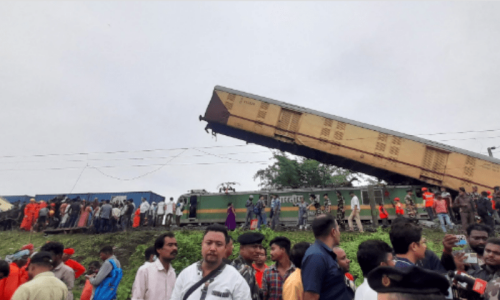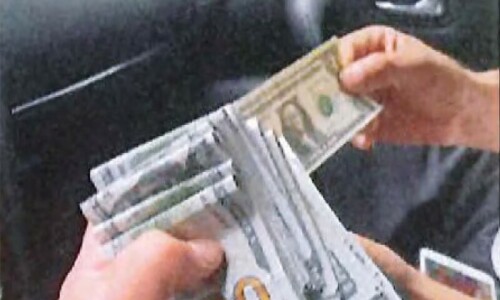TEHRAN: Five years on, Iran can thank the United States for unwittingly aiding its drive for regional power by ousting Saddam Hussein, one of Tehran’s deadliest foes.
The US military had already defeated Afghanistan’s Taliban after the Sept 11 attacks on US cities in 2001 with the unintended consequence of wiping out another of Iran’s enemies and tilting the local balance of forces in Tehran’s favour.
“The removal of these two regimes without powerful successor states benefited Iran greatly...and opened elbow room for Iran to spread its influence,” said Vali Nasr, senior fellow at the Washington-based Council on Foreign Relations.
Iran cannot entirely rule out US military action to destroy its nuclear sites, and its oil-reliant economy may prove vulnerable a few years hence, but for now it is riding high.
The Iraqi army’s swift collapse in 2003 left Iran with no indigenous military rival nearby, weakening the Arab world.
Windfall oil revenues have further fuelled the Islamic Republic’s heady sense of power under its combative president, Mahmoud Ahmadinejad, who has defied western-led efforts to contain Tehran’s nuclear aspirations through UN sanctions.
“Every 24 hours we are earning $270 million ... in hard currency a magic amount,” said Iranian economist Saeed Leylaz. “Iran can transfer its petrodollars to buy loyalty internally and strategic partnerships externally.”
In the last five years, non-Arab Iran has become a weighty player in Iraq, nurturing ties to Shias and other factions. It has gained clout elsewhere in the Arab world via its alliances with Syria, Lebanon’s Hezbollah and the Palestinian Hamas group.
US Arab allies such as Saudi Arabia, Egypt and Jordan are alarmed at Tehran’s rising power, but after the Iraq war’s chaotic outcome, they fear any American assault on Iran would produce another destabilising debacle that would cost them dear.
ON A ROLL
Psychologically Iran appears to hold the upper hand.
“It doesn’t matter what politically correct things we say, the Arab world has shown plenty of fear, wariness and anxiety over Iran, whereas Iran is not reciprocating,” Nasr said.
Prospects for American strikes on Iran receded sharply when a US National Intelligence Estimate (NIE) released in December surprisingly asserted that Tehran had halted a drive to make nuclear weapons in 2003 and had probably not restarted it.
This conclusion has drawn some attention away from Iran’s energetic pursuit of uranium enrichment and ballistic weapons development, seen by some western analysts as more significant than any immediate attempt to make an atomic bomb.
“We didn’t change our assessment of the threat, but the NIE whipped the carpet from under us,” said one European diplomat, who argued that the US document had made it harder to rally world powers behind tougher UN sanctions against Iran.
In the last few months, several Arab leaders have visited Tehran, while Ahmadinejad has made groundbreaking trips to Iraq, Saudi Arabia, the United Arab Emirates and Qatar, partly in a bid to allay Arab concerns about Iran’s new regional sway.
“It shows that whatever the Arabs think of Iran’s leaders, they must take into account that after Saddam’s fall, Iran is emerging as a major power in the area,” the diplomat said.
This is anathema to the United States, whose relations with Iran have been marked by mutual venom since the 1979 Islamic revolution overturned its main Gulf ally, the Shah.
President George W. Bush, who in 2002 labelled Iran part of an “axis of evil”, accuses it of meddling in Iraq, Lebanon and the Palestinian areas charges Tehran hurls straight back.Iran, while bent on thwarting US-Israeli aims in the region, wants Iraq to remain a single state that would secure the interests of its Shia community, but would not be strong enough to threaten its neighbours, analysts in Tehran said.
Washington, which shares Iran’s commitment to Iraq’s territorial unity, has let its diplomats in Baghdad hold three meetings with their Iranian counterparts in the past year.
But the formal discussions have not blossomed into any broader dialogue aimed at resolving US-Iranian disputes.Nasr said the United States, with a strong military presence in Iraq, Afghanistan and the Gulf, still blocks Iran’s way.
“Iran ultimately cannot confirm its current status and the new balance that has emerged in the region without getting the United States to stop resisting it,” he argued.
“Ahmadinejad believes Iran can get its way by bullying and harassing. I’m not sure all of Iran’s leaders are convinced that it’s a prudent strategy,” Nasr added.—Reuters











































Dear visitor, the comments section is undergoing an overhaul and will return soon.